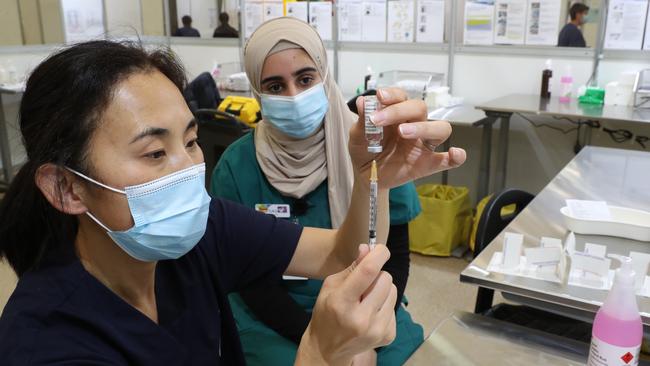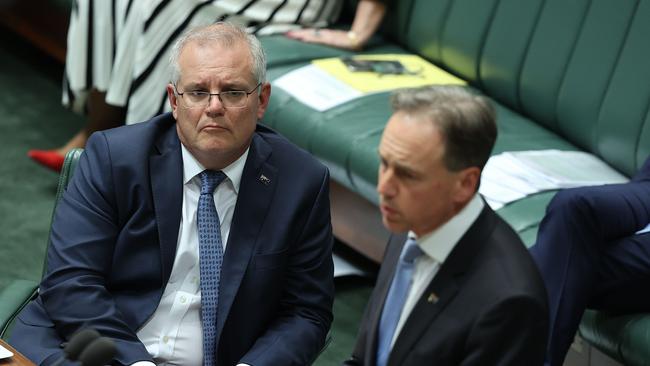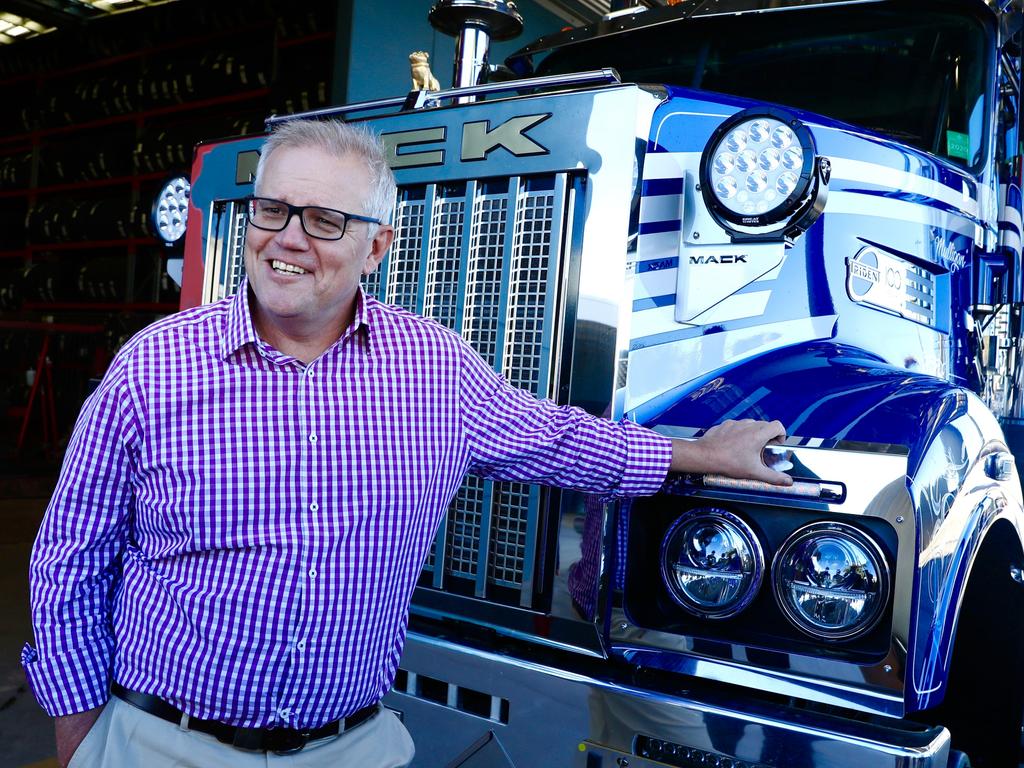Coronavirus: Scott Morrison’s jab plan for travel freedom
PM pushes states to lift domestic restrictions on vaccinated Australians as part of a road map to entrench more freedom of movement.

Scott Morrison is pushing the states to lift domestic COVID-19 restrictions on fully vaccinated Australians as part of a road map to entrench more freedom of movement within Australia and eventually lead to the reopening of international borders.
As politicians, medical experts and business and community groups say the country must prepare to live with COVID, the Prime Minister and Health Minister Greg Hunt have outlined a new goal under which states would commit to exempting vaccinated Australians from snap lockdown measures and internal border closures.
States are insisting on high vaccination levels before relaxing to overseas travellers after NSW Premier Gladys Berejiklian said 80 per cent of the adult population would need to be immunised before she considered reopening the international border.

Northern Territory Chief Minister Michael Gunner said he was prepared to remove restrictions on vaccinated Australians when there was community transmission once the vaccine rollout had achieved herd immunity. But Mr Gunner said there was not enough evidence to inform clinical advice on how many people in the Territory should be vaccinated before opening to overseas.
“COVID is here to stay and at some point it will either get into Australia or we will have to let it in after having achieved a herd immunity target,” Mr Gunner said.
“The challenge is to get to that point where we live with the virus without it first causing the devastation the Spanish flu did.”
While an overwhelming majority of voters back a Fortress Australia international border policy and want them to remain closed until the global pandemic is under control, business leaders and some Coalition backbenchers want to reopen the country as soon as possible. Australian Medical Association president Omar Khorshid also said the country could reopen by the end of the year.
Last week’s federal budget assumed overseas travel would stay at low levels until mid-next year and an exclusive Newspoll conducted for The Australian showed 73 per cent of voters endorsed that time frame.
But Virgin Australia chief executive Jane Hrdlicka said on Monday the political narrative needed to change and acknowledge the virus would be in the community once the most vulnerable Australians were vaccinated, even though that might mean more deaths.
“It will make us sick but won’t put us into hospital,” Ms Hrdlicka said. “Some people may die but it will be way smaller than the flu.
“We’re forgetting the fact we have learnt to live with lots of viruses and challenges over the years and the government has to learn to live with this and sooner than June 2022.”
Department of Prime Minister and Cabinet secretary Philip Gaetjens is trying to achieve consensus among his state counterparts on a reopening road map to put to national cabinet, which could include restriction-free domestic travel for vaccinated Australians, fewer restrictions on vaccinated people returning from overseas, more travel bubbles and new quarantine arrangements for international students and specialist occupations.
“It’s not ‘one day the borders are open, one day the borders are closed’,” Mr Morrison said. “That’s not how it works. There’s a sliding sort of scale here.
“We’re working on the next steps. It’s not safe to take those next steps right now.”
Mr Hunt pointed out that the US, where there had been “prodigiously difficult lockdown laws” in some states, was now treating vaccinated residents differently, with “lesser requirements” imposed on them. “People are able to travel freely (in Australia) unless there’s a hotspot … where there are outbreaks or issues relating to state borders there is the potential for those who have been fully vaccinated to be exempt from some of those restrictions,” he said. “That’s the goal.”
With more than 3.1 million COVID vaccine doses administered across the country, Ms Berejiklian said five million of the six million NSW adults (83 per cent) would need to be vaccinated before the state looked to open up to international visitors. She is the first premier to set such a target.
That would require 10 million injections, compared with about 920,000 in NSW so far.
“I hope that if the vaccine rollout is better than anticipated (in the budget papers), that date can be brought forward,” Ms Berejiklian said. “I would never, ever make a decision that compromises the safety of the community but we also need to be ambitious. We need to accept that we have to live with COVID.
“We don’t know how many years for, but if the majority of our population is vaccinated, we can start thinking about those things.”
Marylouise McLaws, an epidemiologist at the University of NSW who has been tracking vaccination numbers, said the state would need to boost its seven-day rolling average of about 10,000 injections a day to about 38,000 in order to vaccinate 80 per cent of the population by year’s end.
“For all of Australia, they’d have to do 155,000 injections per day by the end of the year to get to 85 per cent of the population vaccinated,” Professor McLaws said. “By the end of June next year it is quite doable, at an injecting rate of no less than 110,000 injections per day, seven days a week.”
West Australian Premier Mark McGowan said it was far too early to consider any border changes while the virus was out of control in much of the world.
“It’s not helpful to set arbitrary deadlines or targets because, as we’ve seen throughout the course of the pandemic, COVID is unpredictable and the best thing to do is to maintain caution and heed the health advice,” Mr McGowan’s spokeswoman said.
Acting Victorian Premier James Merlino said vaccinating Australians as quickly as possible and an alternative to hotel quarantine — such as the Howard Springs-style facility pitched by his government and being considered by Mr Morrison — were the key to opening the border. South Australian Premier Steven Marshall said the international border would ultimately open to the world next year.
A passenger who returned at the weekend on the first repatriation flight from India since the travel ban was lifted has tested positive for COVID-19, despite having passed two negative tests before flying.
ADDITIONAL REPORTING: ROBYN IRONSIDE, PAUL GARVEY, RACHEL BAXENDALE







To join the conversation, please log in. Don't have an account? Register
Join the conversation, you are commenting as Logout